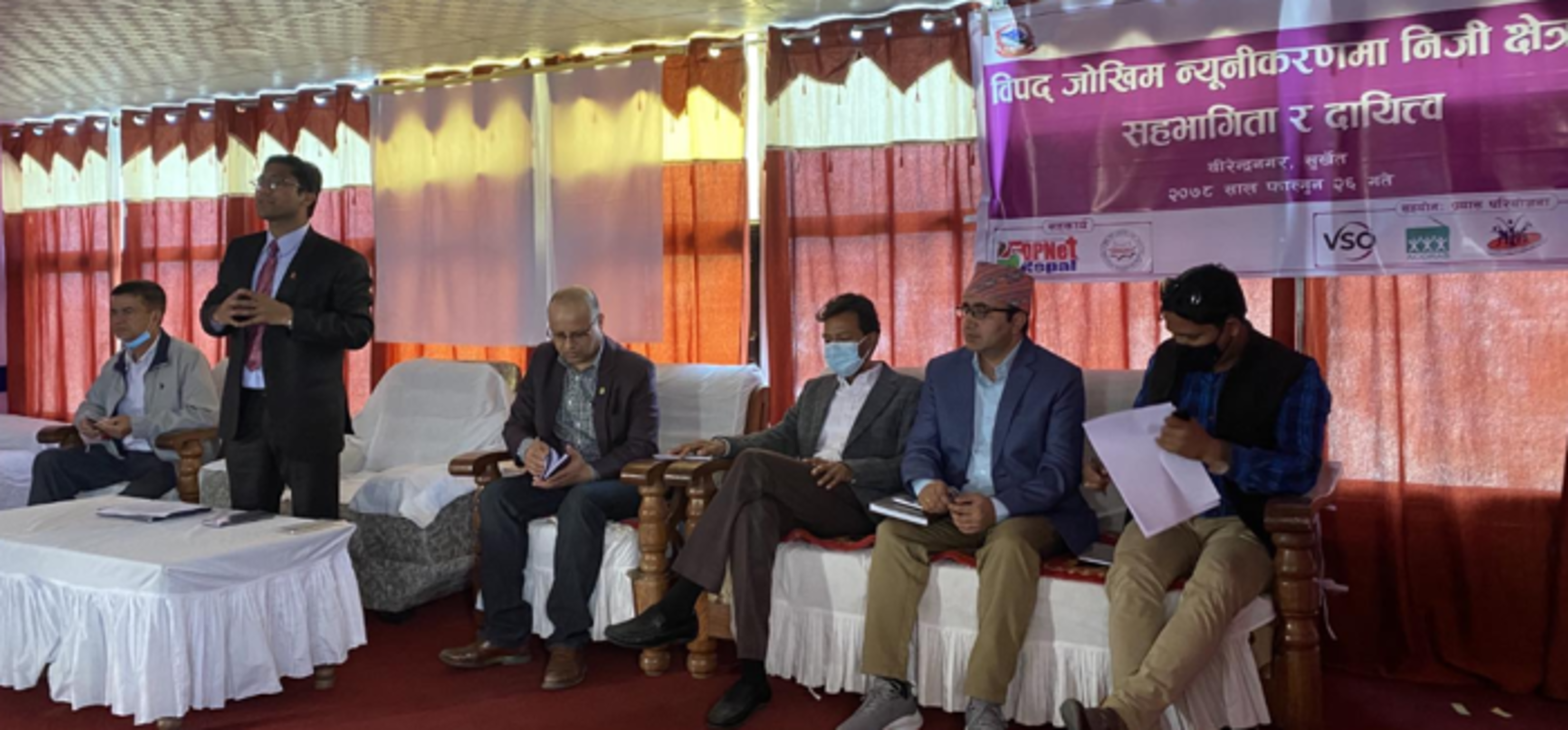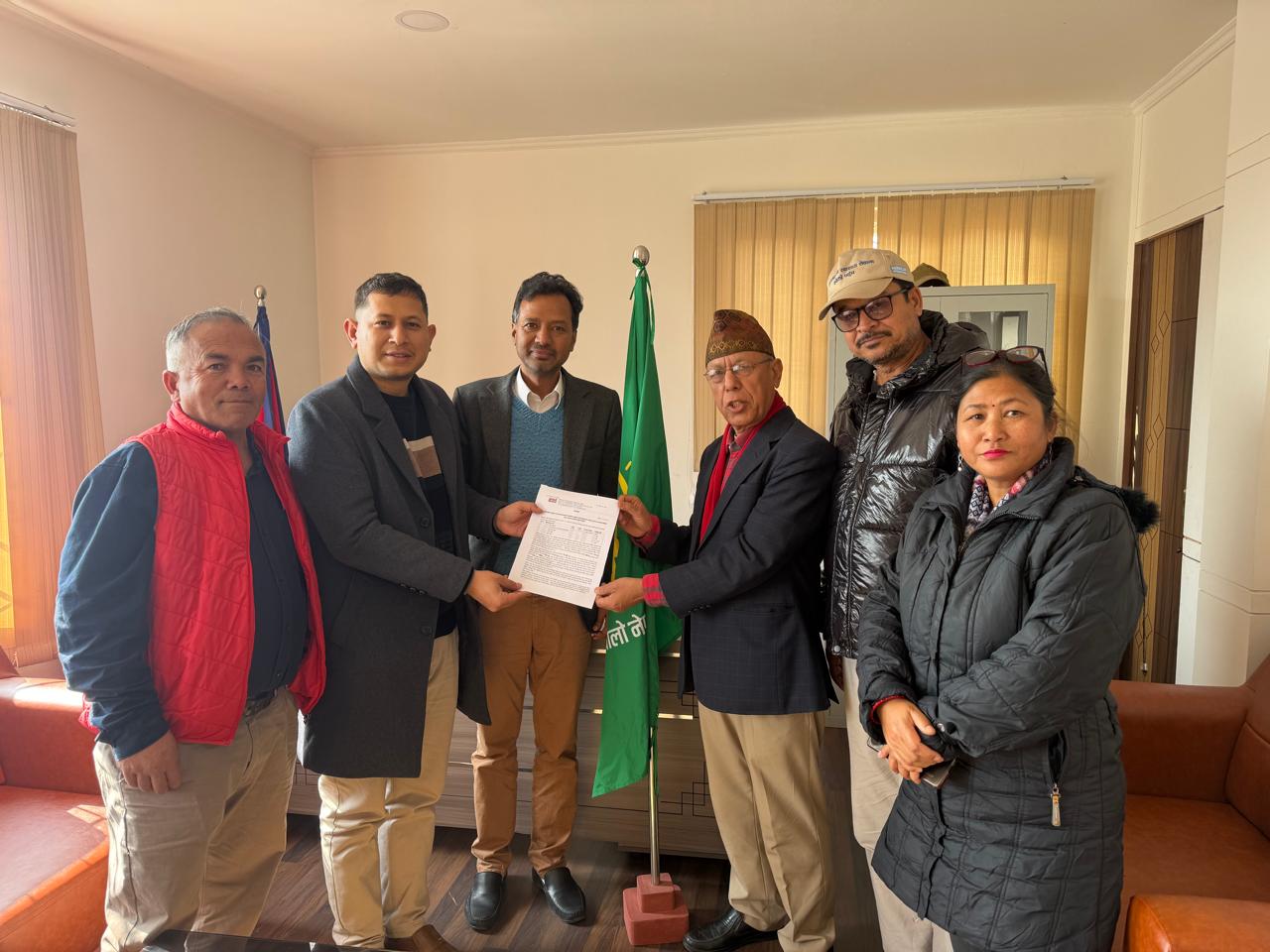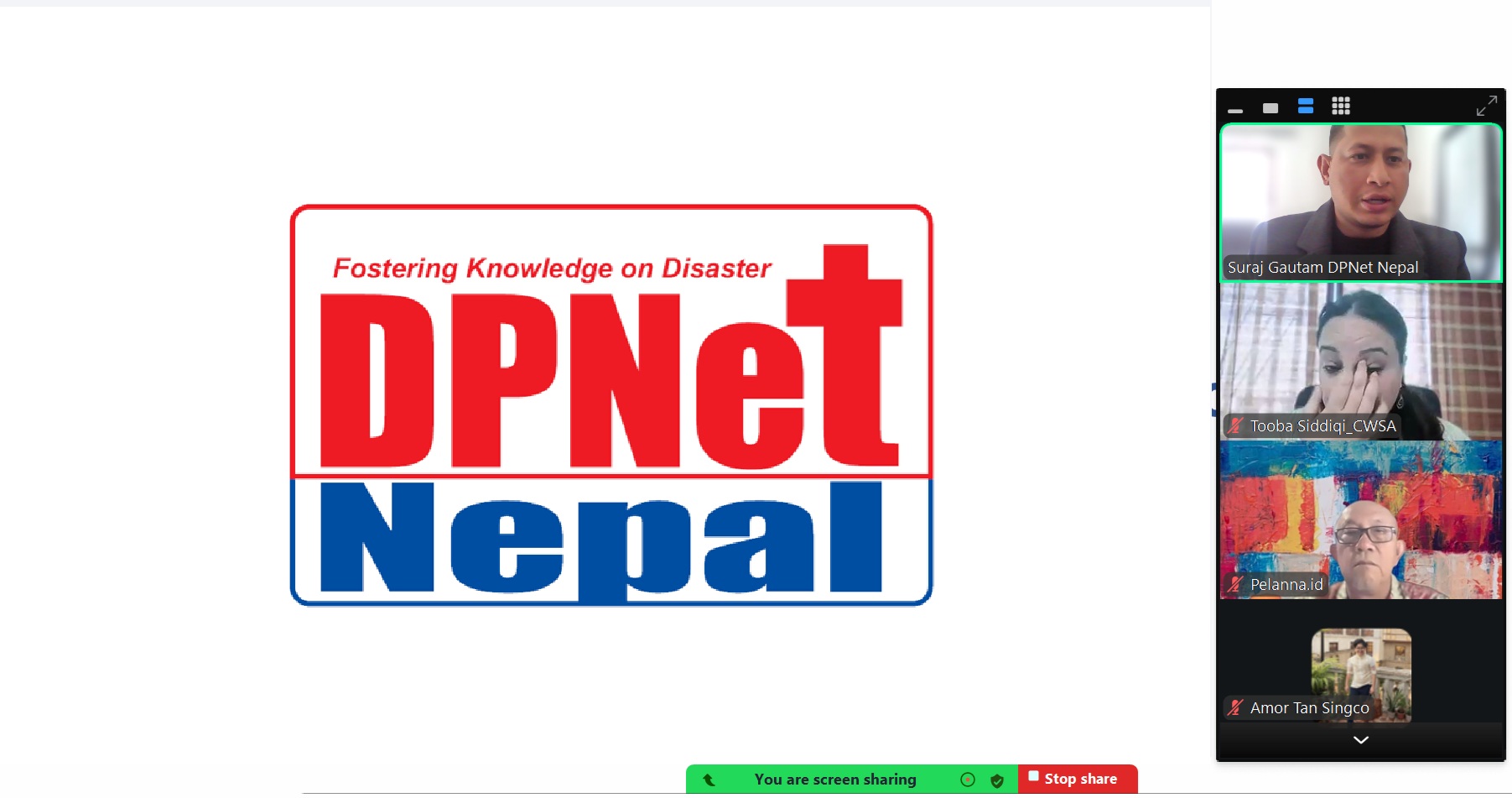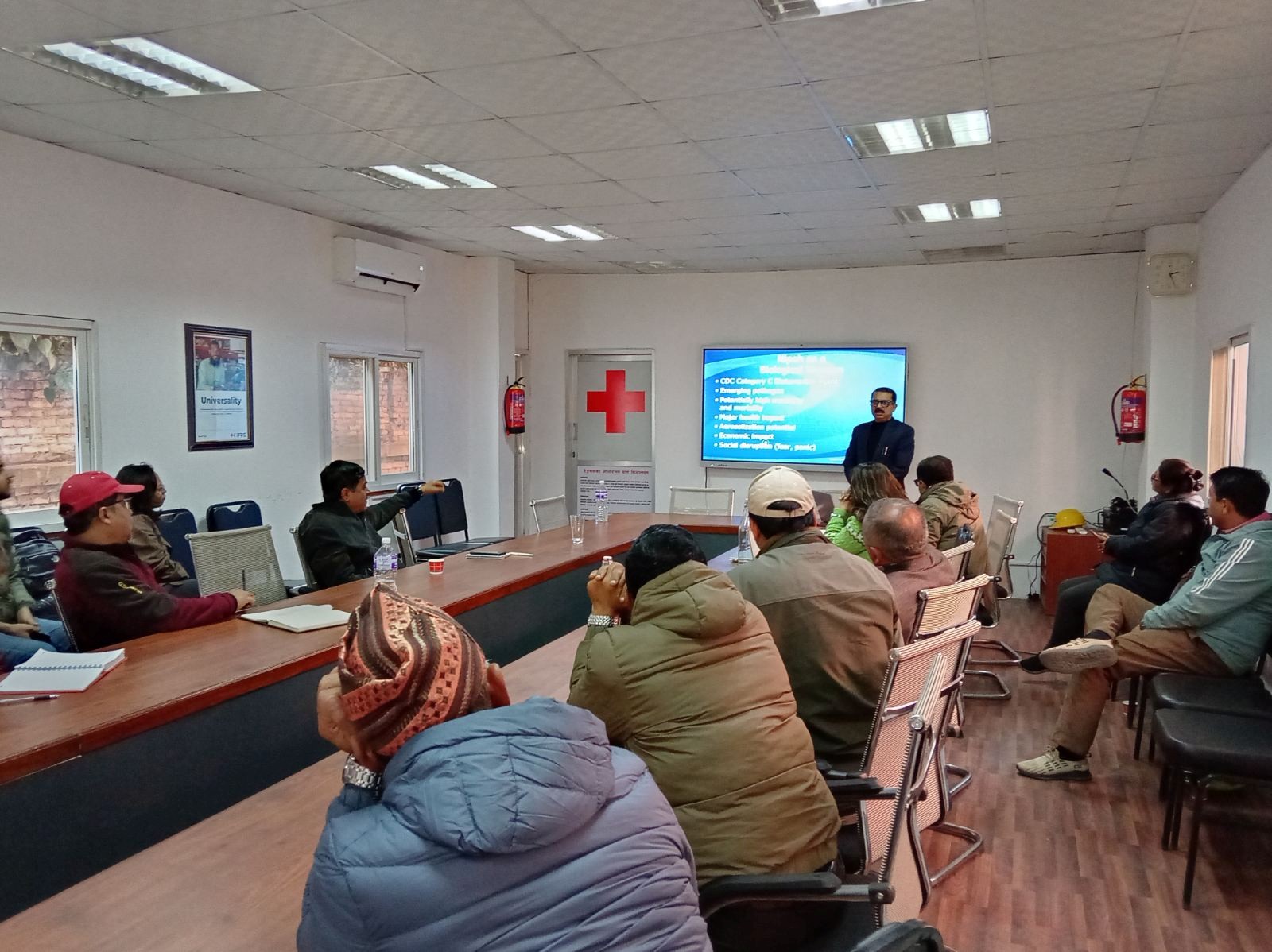A brief Report on Private Sector’s Participation & Responsibility in Disaster Risk Reduction Workshop (Karnali Province)

A workshop on private sector’s participation in disaster risk reduction was organized by NDRRMA in collaboration with Friends Service Council Nepal, Association of Youth Organizations Nepal (AYON), Association of Community Radio Broadcasters Nepal (ACORAB), Volunatry Service Overseas (VSO) Disaster Preparedness Network (DPNet Nepal) and Disaster Management Network, Nepal (DiMaNN) on 10th March 2022 at Hotel Nirvana, BirendraNagar Surkhet. The program was followed by chairing the program, guests’ remarks, introduction of the participants, presentation, group work & presentation, open discussion, selection of Provincial focal organization for NPDRR Private Sector Subjective Group and closing the session.
Dr. Dijan Bhattarai, Undersecretary, Spokesperson of NDRRMA chaired the workshop. Mr. Prem Giri, Secretary of Ministry of Internal Affairs and Law (MoIAL) was the Chief Guest of the program. Mr. Rishi Raj Acharya, Under Secretary of Ministry of Federal Affairs and General Administration (MoFAGA), Kedar Neupane, Former Secretary of Government of Nepal, Dr Raju Thapa, Acting Chairperson of DPNet Nepal, Dr. Nirmala KC, Board Member of FSCN and Executive Director of ACORAB Nepal Mr. Bal Krishna Basnet graced the program as a special guest.
Altogether, 45 persons from private sectors joined the program.
Major Highlights
- Administrative Officer, District Administration Office, Surkhet highlighted the roles of the private sector in DRR and how they can coordinate with the government to mitigate the risk of disaster. He said, in times of disaster, private sectors themselves are affected, yet they are the one who respond and provide assistance to the affected community and area during disaster. So, we need to have a collaborative approach in DRR to get better results.
- Mr. Rishi Raj Acharya, Under Secretary, MoFAGA, elucidated the important role the private sector has been playing in DRR and expressed the government’s urge to join hands with the sector in mitigating the risk of disaster. Coordinated efforts of all the sectors is important and the private sector is resourceful in terms of their capacity to mobilize the resources during disaster, this sector’s role should be capitalized in DRR. In some cases, the same working modality of three levels of government also led to creating gaps in effective coordination. Further, appreciating the contribution of private sector in DRR and specially during COVID -19 pandemic, he said, though, private sectors were hard hit during the pandemic they left no stone unturned to provide humanitarian assistance to people, government and organizations with life saving equipment, masks, sanitizers etc. He asked the private sector to contribute to the DRR Strategic Plan of Government with concrete suggestions and programs. Mitigating the risk of disaster, according to him, is the issue of collective accountability, so we need to talk, work on the risks and share the learnings together. And collectively we can make the local governments accountable to address the risk of disaster. Private sectors should have a formal group so that the government gets ease in coordinating with the private sectors.
- Mr. Kedar Neupane, Former Secretary, MOHA, said disaster doesn’t occur with prior notice. We need to be well prepared. He shared his experiences that in the past, there was a tendency to depend entirely on the government during the time of disaster. We need to understand that the private sector is a larger sector and is resourceful. He defined the private sector as all the groups beside the government are the private sector; media, civil society organizations, industries etc. And the private sector can contribute with labor, money and knowledge in the DRR sector. This resourceful sector needs to be mainstreamed in DRR so that we can reduce the human casualties as well as economic damage during a disaster. In the past, we had so many discussions on individual rights, which burdens one sector. This workshop focused on responsibility. Each sector has responsibility in DRR. Preparedness helps to reduce the risk and manage the disaster.
- Dr. Raju Thapa, Acting Chairperson, DPNet Nepal, highlighted the concept of the National Platform for Disaster Risk Reduction (NPDRR). He said, UNDRR envisioned the concept that not a single stakeholder alone can address the risk of disaster, all sectors need to join hands together to mitigate the risk of disaster. Private sectors have been playing important roles in providing assistance in form of materials support to the affected or equipment supports to the government during the disaster. However, their assistance was scattered and not well documented. He added, NPDRR has a guideline that had been endorsed by the DRRM Executive Committee of the Government of Nepal. The guideline has a clear provision of forming a DRR platform in three tiers of government. Today’s workshop, he said, is one of the initiations to form a Province Level Platform of private sectors group. During his remarks, Dr. Thapa gave examples on how private sectors can benefit from being DRR sensitive and encouraged them to have a common platform for further coordination, sharing and learning. As an example of the benefit of forming a province level platform of private sector groups, he said, the group can have discussion and recommend and demand the government to get custom sanction in importing equipment/goods used in DRR, tax reduction for trades that contribute to DRR, in the upcoming Finance Bill. With a solid plan of action, the private sector can relate their demands with their responsibility in DRR. Giving multiple benefits to private sector groups, he said, it’s easier to collaborate with NDRRMA, since NDRRMA plays a catalyst role between government and private sector. Having an important role in DRR, He urged the private sector participants to form a loose forum and request to invest in DRR.
- Mr. Pallav Panta, Chairperson of Atullya Foundation through his presentation titled ‘ Inclusive DRR and Private Sector’, informed the participants that unsystematic urbanization and unchecked industrialization has led to disability. His presentation highlighted that the COVID pandemic had badly affected the livelihood and economy. Economic activities are shrinked leading to low economic growth. Small and medium enterprises face more difficulties, since they have lower capacity to tackle the pre, during and post disaster situation. He explained four priorities of the SENDAI Framework for DRR: Understanding Disaster Risk, Improving Disaster Risk Governance, Investing in Disaster Risk Reduction and Preparedness, Early Warning and Building back better in the aftermath of Disaster. He further highlighted the problems and challenges of Nepali youths as such: lack of quality, relevant and employment oriented education, semi employment, political instability, migration of youth, lack of youth friendly environment for investment and entrepreneurship, etc. And as opportunities, grants for youth oriented entrepreneurship development, tax reduction, training etc. Concluding his presentation, he said, the youth related provisions should be accessible to youths.
- Ms. Rekha Oli of AYON, gave a brief introduction to AAYON and its activities in DRR sectors. AAYON is dedicated to advocacy for the engagement of youths in the DRR process.
- Mr. Balkrishna Pokhrel, CEO of ACORAB Nepal shared that they have been involved in capacitating Volunteer Radio Journalists with disaster related terminology. For effective reporting of local news, the local people should be engaged in reporting news which helps to localize disaster risk reduction and management.
- Dr. Nirmala KC, Board Member of FCSN, in her remarks said, disaster risk reduction should be the priority of all. Investment, profit and risk are the components of the private sector. This sector invests and works with diligence. Emphasizing the importance of practicing ethics in the working environment, she said human behavior also is catalytic in the operation of any business. Private sectors have innovative and risk taking behavior, they need to be linked to DRR as their social corporate responsibility.
- Mr. Bishnu Prasad Timilsina, General Secretary of DiMaNN, highlighted the ‘Importance of Network in DRRM’ in his presentation. Networks ease the coordination process and avoid duplication in our work. Beside the networks helps to raise the standard of working procedures, learning and sharing from each other contributes to effectiveness. As an encouraging remark, he urged the participants to walk together for an effective result.
- Dr. Raju Thapa, Acting Chairperson of DPNet Nepal and resource person of the session, in his presentation highlighted the importance of forming Province Level Private Sector Group under NPDRR. DRR should be made the concern of all so the private sector too needs to be mainstreamed in DRR. He elucidated the importance of forming private sector groups through participatory group work. Participants were divided into 4 groups and were given some questions. The groups had inter group discussion and written in chart paper and presented in the open forum.
Questions for Group Discussion:
1. Why is the private sector important in disaster management in Karnali Province?
2. How can private sectors be engaged in province level disaster management?
3. Which are the main private sectors that can play an important role in DRM at the province level?
4. Which organization from a private sector group can be the focal point of DRRM in the province?
For the first question, all the groups agreed that the government does not have a presence in all places because of geographical and resource constraint and private sectors have equipment and resources, this sector is important in DRRM.
The groups presented that the sectors should be engaged in DRRM through their participation in DRR training and involving the private sector in governments DRR mechanisms.
The participants’ response to the third question was, province level FNCCI, FNCCI Surkhet, Federation of Forest based Industry and Trade Nepal can play an important role in Province level DRM.
For the fourth query, the groups nominated FNCCI as a focal point of the private sector for contacting/coordinating from NDRRMA.
The participants endorsed FNCCI K name as a focal point of the private sector group. Dr. Raju Thapa concluding his presentation thanked the participants for their initiation to name a focal point since it will ease and open a door for further coordination.
- Dr. Dijan Bhattarai, Under Secretary and spokesperson of NDRRMA and in his presentation explained that, NDRRMA is an authorized agency of government of Nepal to respond to DRR. With a spirit of collaborating different sectors in DRR, he said, Disaster Risk Reduction and Management Act, 2017 came into existence. State has now prioritized DRR, and is seeking collaborative efforts from all sectors. Different stakeholders have different roles in DRR. Media sectors have now started to broadcast news on awareness generation in DRR, academia is working on to develop a roster of experts in DRR sectors, likewise affected communities are raising their voice through different forums and NDRRMA is coordinating all these groups for effective response to DRR. Given the example of climate change induced massive disaster during the 30 years short span of time, all sectors should join hands to mitigate the risk of disaster. He stressed on the necessity of having a forum of private sector groups and appreciated the efforts of the private sectors in providing relief during disaster. He explained the area of coordination, like in physical infrastructure development where the private sector needs to be DRR sensitive. Since the sector is aware of the risk area within their trades, they need to work on making their trade and industries disaster resilient. They can encourage fellow trades and businesses to enroll in insurance policies.
- Briefing the importance of establishing a basket fund for DRR, he urged private sector participants to invest at least 0.5 percent of the profit in the basket fund and mobilize the fund in reducing the risk of disaster. He asked the private sector to have discussions within the group and expected a proper plan. When they vocalize their demand with a clear statement how the demand eventually contributes to DRR, the government obviously opted to fulfill it.
- Mr. Kedar Neupane, Former Secretary, MOHA, in his remarks gave practical examples that disasters have different facets, during the monsoon, consuming even the wild mushrooms causes human casualties. He urged us to start with self and from today, are our behaviors DRR friendly, we need to do DR analysis.
- The Chief Guest of the program, Mr. Prem Giri, Secretary of the Ministry of Internal Affairs and Law, said, to address the risk of DRR, the government alone can’t go long and far. Several meetings were held in the past to formulate disaster preparedness plans. Private sectors, as an important entity of DRR, should join hands with other stakeholders of DRR in mitigating the risk of disaster. Karnali Province has established an Emergency Fund and is active in addressing the disaster risk in its capacity which in the days to come is insufficient. So as a resourceful sector, the private sector should collaborate with the government to address the disaster risk in the coming days. He also appreciated the effort of NPDRR initiatives and gave words to speed up the process to form Provincial Level Platform for DRR as per NPDRR guideline. He thanked all the participants and again urged the private sectors to collaborate with government and other stakeholders in DRR, through a formal forum, which even the NPDRR recognized and closed the workshop.
Conclusion:
The workshop on Private Sector’s Participation & Responsibility in Disaster Risk Reduction, succeeded to educate and internalize the participants about the roles of private sectors in DRR. Participants were well informed of the NPDRR and its nine thematic groups. Through a series of presentations, experience sharing, group works, participants internalize the urgency to capitalize the private sectors’ efforts in DRR. The workshop nominated Karnali Province FNCCI, as a focal point of a private sector subjective group under NPDRRA.











